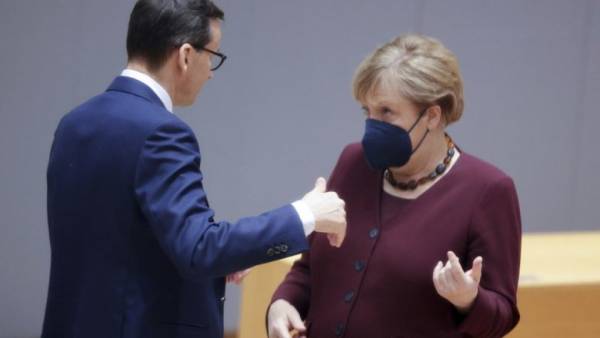
Polish Prime Minister Mateusz Morawiecki criticized Acting Chancellor of Germany Angela Merkel for & nbsp; nbsp; President Alexander Lukashenko reports DPA.
Commenting on the crisis with & nbsp; migrants on the & nbsp; border of Belarus and & nbsp; the European Union, Moravetsky said that & nbsp; the EU should participate in & nbsp; the search for a diplomatic solution.
& laquo; But & nbsp; When Chancellor Merkel called Mr. Lukashenko, she contributed to & nbsp; legitimization of his regime, although the fight for & nbsp; free Belarus has been going & nbsp; for 15 months already & nbsp; & mdash; he said, referring to the protests that took place on the & nbsp; territory of Belarus since & nbsp; August last year after the presidential elections.
At the same time & nbsp; the head of the Polish government noted that & nbsp; Lukashenka “ abused '' a conversation with & nbsp; Merkel and & nbsp; “ pretended '' that & nbsp; she agreed to transport 2 thousand illegal migrants to & nbsp; Germany and & nbsp; other European countries. “ A & nbsp; this is wrong '', & nbsp; & mdash; summarized & nbsp; he.
Lukashenko and & nbsp; Merkel held two telephone conversations on November 15 and & nbsp; 17 & nbsp;, during which they discussed the migration crisis. Merkel said that & nbsp; Lukashenka is a contact person in the & nbsp; migration crisis, but & nbsp; this does not & nbsp; change anything in & nbsp; that & nbsp; & nbsp; Germany does not & nbsp; consider the results of the Belarusian presidential elections in & nbsp; 2020-m. >Some details of the first conversation between Merkel and & nbsp; Lukashenko were later disclosed by Estonian Foreign Minister Eva-Maria Liimets. According to & nbsp; she said, the Belarusian president issued an ultimatum & nbsp; & mdash; ending the migration crisis in & nbsp; exchange for & nbsp; recognition of the legitimacy of his power and & nbsp; lifting all Western sanctions against & nbsp; Belarus.
According to the & nbsp; results of the second conversation, Lukashenka's press service reported: the parties reached an understanding that the & nbsp; problem in the & nbsp; whole should be brought to the & nbsp; level of Belarus and & nbsp; the EU, they will identify persons who will immediately enter into & nbsp; negotiations with & nbsp; in order to resolve existing problems. International organizations will also take part in & nbsp; & mdash; this was insisted on by the President of the European Commission, Ursula von der Leyen. The & nbsp; course of work will also take into account the desire of migrants to get to & nbsp; Germany.
The migration crisis on the & nbsp; border of Belarus with & nbsp; Latvia, Lithuania and & nbsp; Poland, where from the beginning of the year migrants rushed, mainly from the & nbsp; Middle East, escalated sharply on November 8 & nbsp; Several thousand people came from the & nbsp; Belarusian side to the & nbsp; Polish border and & nbsp; do not & nbsp; leave the border zone, some of them tried to get into & nbsp; the territory of Poland, breaking the barbed wire fence. Countries & nbsp; EU accuse Minsk of deliberate escalation of the crisis and & nbsp; call for & nbsp; imposition of sanctions. Lukashenka stated that & nbsp; in this situation the Western countries themselves are to blame, because of whose actions people are “ fleeing from the & nbsp; war. ''